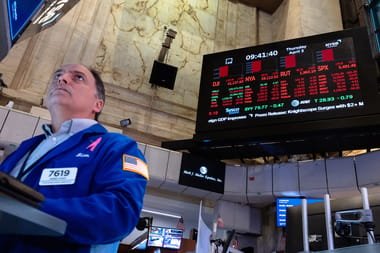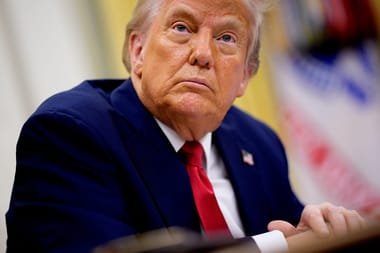Analysts are predicting a cut to 2.25 percent from 2.5 percent.

The European Central Bank is widely expected to lower its key interest rate to 2.25 percent from 2.5 percent on Thursday as it attempts to counter a slowdown in the eurozone economy linked to U.S. trade policy.
The bank’s governing council is meeting against a backdrop of severe volatility in global financial markets, which has reached a fever pitch not seen since the height of the Covid-19 pandemic. Markets regained their composure this week, with key stock market indices paring back some of their losses, and yields on government debt dropping.
But the U.S. S&P 500 is still 4 percent below where it was before Donald Trump’s April 2 “Liberation Day” announcement. Yields on 10-year U.S. government debt remain 0.16 percentage points higher.
Economic forecasters have upped their expectations of a recession in the U.S. as business and consumer confidence drops in response to the wide-ranging tariffs introduced by U.S. President Donald Trump. The effect of the tariffs — coupled with a slowdown or recession across the Atlantic — would likely also have a negative impact on the eurozone’s outlook.
An analysis by the ECB predicts that 25 percent tariffs on the eurozone would lower gross domestic product by 0.3 percent in the first year.
“Germany’s fiscal U-turn and the promise of increased defence spending across Europe had raised hopes for accelerated growth starting next year. This optimism was reflected in improved confidence indicators, particularly in the expectations component,” writes Peter Vanden Houte, chief economist for the eurozone for bank ING. “However, recent tariff announcements have altered the landscape.”
It’s an assessment shared by policymakers.
“Global growth prospects have deteriorated massively,” Joachim Nagel, president of Germany’s Bundesbank and governing council member, said last week. “Monetary policy in Europe will do its part.”
Before the April 2 announcement, the ECB’s governing council was debating whether it was time to pause or slow rate cuts as inflation returned close to its 2-percent target and the effects of looser monetary policy were reflected in the lending statistics. However, the prospects of a sustained economic slowdown have given new impetus to advocates of a looser monetary stance.
Bank of France chief François Villeroy de Galhau said that the ECB needed to cut rates “soon.” “The changes since April 2 argue in favor of an imminent cut,” he said. The ECB’s April bank lending survey published on Tuesday already points to muted economic activity, with net demand for loans by firms falling by 3 percent.
In a note to clients, Bank of America analysts write that “most ingredients point to weaker inflation prospects than a month ago.”
“[T]he risk of deeper cuts has risen, including larger-than-25 [basis points] moves as early as June,” the bank’s analysts write.




